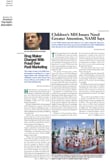While it is common knowledge that anxiety and depression are related, exactly how remains in question.
A new German study, published in the May Journal of Clinical Psychiatry, has one answer: A number of anxiety disorders appear to be capable of triggering a major depression.
The study was a joint collaborative program between the Max Planck Institute of Psychiatry and the Institute of Clinical Psychology and Psychotherapy at Dresden Technical University. Some 2,500 adolescents and young adults living in the Munich, Germany, area were included in the investigation. At the start of the study, the Munich-Composite International Diagnostic Interview was used to determine whether the subjects had experienced any of five DSM-IV anxiety disorders—generalized anxiety disorder, panic disorder, agoraphobia, social phobia, or specific phobia. Subjects were assessed again with the interview instrument one to two years later, then again three to four years later to learn whether they had experienced a major depressive disorder since the study began. The researchers then attempted to see whether they could find any relationship between having an anxiety disorder at the start of the study and subsequently developing a major depressive disorder.
The researchers found a significantly increased risk of developing a major depressive disorder if one had had, prior to that time, generalized anxiety disorder, panic disorder, agoraphobia, social phobia, or a specific phobia. Generalized anxiety disorder showed the strongest link, followed by panic disorder, then agoraphobia, social phobia, and finally specific phobia.
Also, respondents with two or more anxiety disorders at the start of the study were found to have a significantly higher risk of a major depressive disorder compared with individuals with one anxiety disorder at that time. What's more, subjects with severe disabling anxiety were significantly more at risk of depression than were subjects with less-crippling anxiety.
How might anxiety trigger depression? The researchers speculated on several possible mechanisms. For example, early-onset panic disorder might dysregulate the neurotransmitter serotonin, leading in turn to depression. Or anxiety might lead to reduced academic or occupational performance and fewer social interactions, and these effects in turn might trigger a depression.
The clinical implications of their findings, the investigators pointed out in their study report, are that “effective treatment of anxiety disorders, specifically those associated with extreme disability, might be important for targeted primary prevention of major depressive disorder.”
The study was financed by the German Ministry of Research and Technology and the National Institute of Mental Health.
The study, “What Characteristics of Primary Anxiety Disorders Predict Subsequent Major Depressive Disorder?,” can be accessed online at<www.psychiatrist.com> by clicking on “Recent Tables of Contents” and then the May issue. ▪
